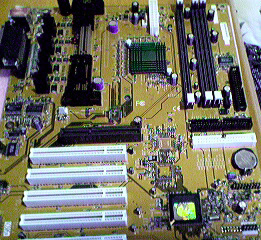|
Expansion:
1 AGP Slot (2/1x)
1 ISA Slot
5 PCI Slots
Inside
the Box
Included
in the SD11's box was the very skimpy user manual, one floppy
cable, one ATA/33 and one ATA/66 cable, the custom I/O shield,
drivers and things on a CD, full versions of Norton Ghost, Norton
Ant-Virus, and Virtual Drive, and of course the Mainboard itself.
FIC also included what at first, appeared to me to be a credit
card. Well, of course it was nothing of the sorts, but another
nifty way off letting you know how to contact their technical
support.
Board
Layout
While
most of the current Athlon mainboards use the AMD 'fester' design
using the AMD 751 North Bridge (known as Irongate) and 751 (Viper)
South Bridge, FIC decided to be a little more creative. Instead,
they are using a hybrid AMD 751 North Bridge and VIA Super South
(686A) South Bridge. Why did they do this you ask? Well, mainly
this setup offers a few key features that the other 'fester'
design does not.

One
main advantage of doing this is because the VIA South Bridge
chipset is supported in Win 98SE, therefore allowing its drivers
to be initially loaded (so you don't have to look all around
for a driver disk). It also offers MC 97 modem and AC97 audio
functionality. On top of that you get support for four USB ports
(two are on board, and the other two can be attached through
an external pin-out). It also offers many power management abilities
along with voltage, temperature, and fan monitoring.
Another
unique addition is the different arrangement of the ATX I/O
panel connectors. The two USB ports come first then followed
by the PS/2 ports, a printer port, and finally only one serial
port. I have no idea whatsoever why they did this, or what advantages
it presents, but what I do know is that they included a custom
I/O shield, of course assuming that you have a removable panel
on your case.
Next
>>
<<
Previous
|